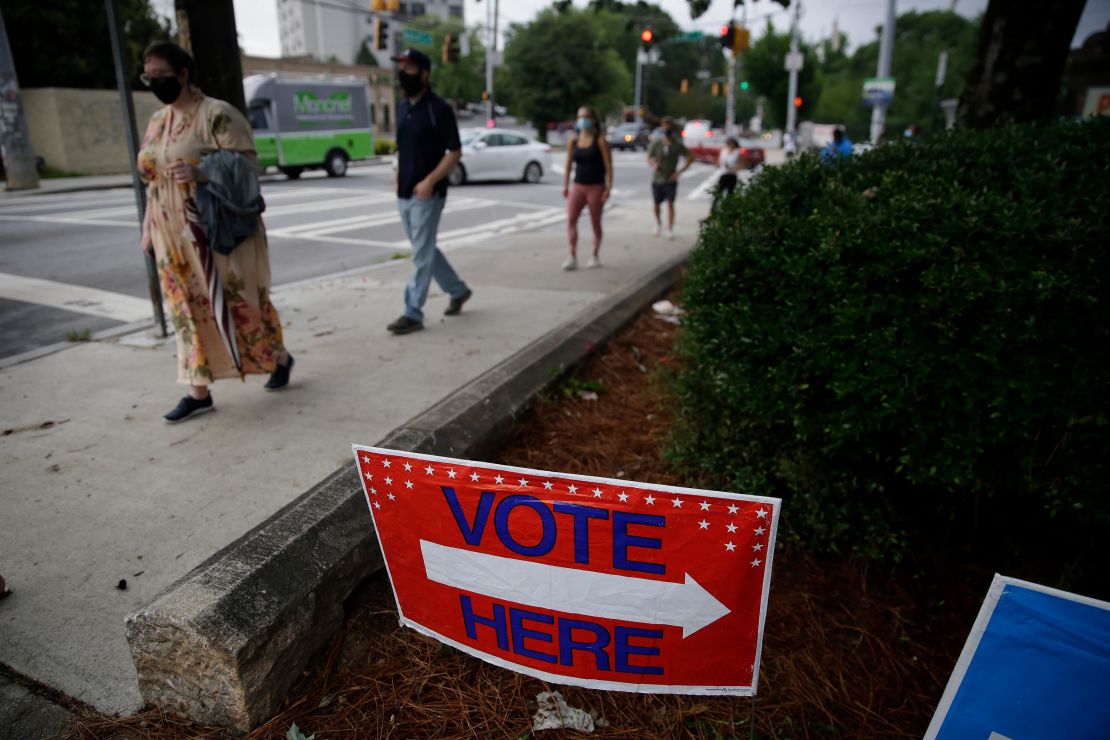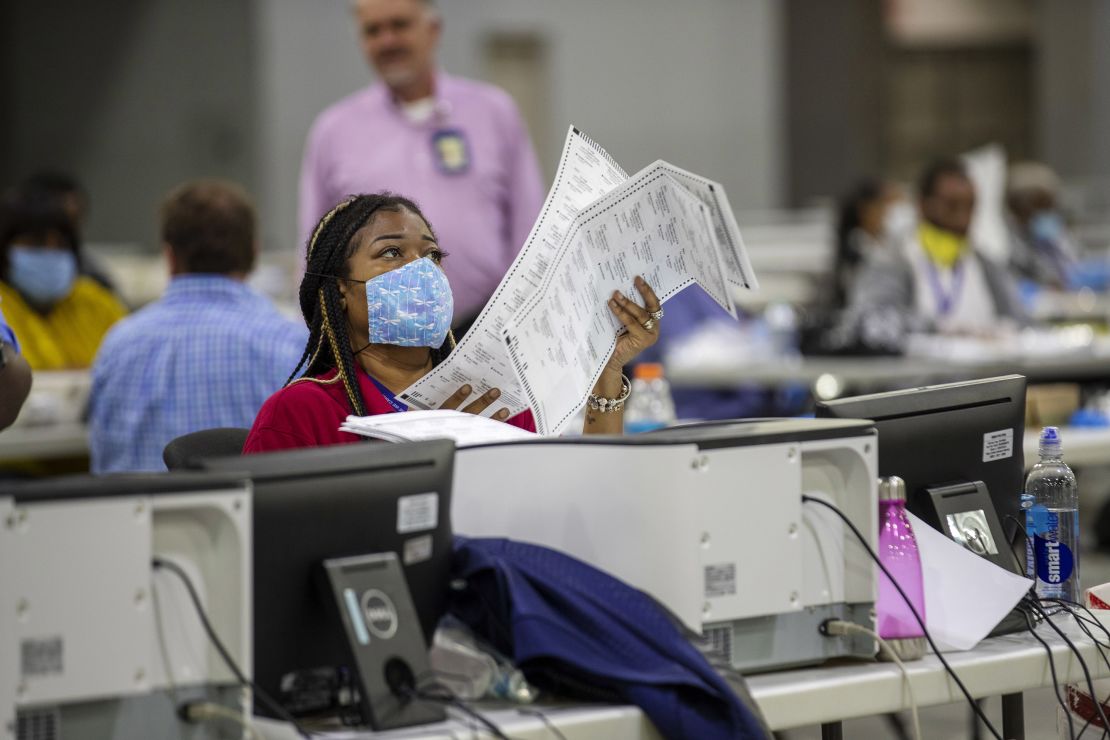A perfect storm of Election Day problems made parts of Georgia the new poster child for the perils states face as they adapt American voting procedures to meet the needs of voters during a pandemic.
In many ways, Georgia’s chaotic experience – which was concentrated in densely populated Fulton and DeKalb counties – was predictable. A high volume of in-person voters and absentee ballots combined with fewer available poll workers and polling locations due to virus fears were all widely anticipated problems that states like Wisconsin, Ohio, and Pennsylvania had experienced in their primaries in the weeks prior.
But the state’s inability to prepare and rectify them underscore for many election officials, activists and experts the need to quickly ramp up funding, preparedness and training ahead of the November general election.
As Congress has stalled on additional funding and support to states trying to prepare for November 3, the warning signs are piling up and time is running out. Now, a top federal election official is calling for lawmakers to act quickly to provide additional funding to states.
“The election officials I talk to are aware of the challenges, but I also know and I can see the real resource challenges, recruitment challenges and voter education challenges, and all those things cost money,” said Ben Hovland, chairman of the US Election Commission. “The $400 million in the CARES Act is a big deal but I think the costs are going to be significantly higher.
“From the election officials I talk to, the need is clear,” he said.
Visit CNN’s Election Center for full coverage of the 2020 race.
After pushing back their primary election twice, Georgia still appeared to be caught flat-footed by problems related to Covid-19. Polling locations in some counties changed at the last minute, after polling sites pulled out due to the coronavirus.
Shanon Dillon-Johnson, a poll worker in Atlanta, was relocated to a new polling location 15 minutes before polls were scheduled to open.
“No one told me to come here until 6:42 a.m. after I had already been at Grady since 5:57,” Dillon-Johnson told CNN. “Calling my superiors emailing them, and then out of the blue we get a call. Because it was like a line of us riding around looking for where we were supposed to go.”
Voters in several polling locations throughout the state reported late opening times. Georgia’s problems were compounded by the fact that the state rolled out new voting machines that were unfamiliar to both voters and poll workers, causing even more delays.
Elections officials in Atlanta also scrambled to replace poll workers unable or unwilling to work during the pandemic.
The result was that in densely populated parts of the state, long lines stretched for blocks and voters waited for hours to cast their ballot. Some voters waited in line until 1 a.m. on election night to have the chance to cast their ballot.
Voters of color impacted
Similar scenes have played out in Maryland, Washington, DC, and Wisconsin where officials have been caught unprepared for the number of voters casting their ballots in person.
“The reality of what you’re seeing in Georgia today is a function of the Covid situation in large part. We did lose many polling places because it’s summer time so schools are closed, churches opted out, VFW halls opted out,” said Gabriel Sterling, Georgia’s statewide voting implementation manager. “In Fulton County specifically, they lost 40 locations and collapsed many of those locations into mega precincts which saw a lot of those amazingly long lines.”
The problems also fit a pattern, observed by researchers, of long lines, last minute location changes and problems with polling machines appearing to affect minority communities the most.
“Consistently on the black polling sites and went to one after the other, including my own,” said LaTosha Brown, co-founder of Black Voters Matter, who also faced a three hour wait to vote on Tuesday. “People have been in line waiting for four or five hours – the machines did not get up until 12:30 p.m. That’s half the day gone.”
Already, data about Georgia’s vote-by-mail applications showed that more white voters requested absentee ballots than black, Asian and Latino voters, suggesting that voters of color were more likely to choose to vote in person, according to a Brennan Center analysis of mail in voting application data.

When they did on Tuesday, they faced long lines and lengthy delays.
“This is a giant warning siren,” said Myrna Pérez, director of the Brennan Center’s Voting Rights and Elections Program. “And so that means the quality of the day experience meant more for communities that were not voting by mail. And they didn’t come through.”
“It will be suppressive,” Perez said.
Challenges with mail-in voting
Georgia’s experience also suggests that other states and jurisdictions new to mail-in voting will likely face similar challenges as they seek to rapidly ramp up capacity for November.
In Georgia, some voters reported being confused by the instructions that came with their ballot that referenced an “inner envelope” that wasn’t provided.
Runbeck Election Services, which was contracted by the state to mail the ballots, told CNN the reference was a mistake that was the result of a miscommunication between the company and state election officials who are less fluent in the specifics of mail in ballots.
“It was just a lack of understanding on both parties, on Runbeck’s as well as the state that, OK, here’s what it really means. And that created some some confusion,” said Runbeck’s President and Chief Operating Officer Jeff Ellington.
Stacey Abrams, who after her failed run for Georgia governor has championed voter suppression issues, said that she experienced a different problem with her ballot.
“Although I applied for it fairly early in the process when it finally arrived, the return envelope was sealed,” Abrams told CBS News. “I tried to steam it open because I watched a lot of ‘Perry Mason.’ It didn’t work. And so I had to go vote in person.”
“This is a complete meltdown and a failure of the secretary of state’s office,” said Abrams.
The state received nearly 1.6 million absentee ballot applications – several times more than they typically do during a primary election. County officials were overwhelmed and slow to process many of the applications.
“I’ll tell you where the biggest breakdown was, in my opinion, was how long it took us to process the absentee ballot applications,” said Fulton County Commissioner Liz Hausmann. “Folks had gotten those application request forms six to eight weeks ago. And so when they weren’t getting a response, and they couldn’t find out what had happened to their request, they didn’t have faith that they could reply in time if they even got it.”
“So many people I talked to today would not have been in line if they had gotten that ballot back,” she added.

Atlanta voters Kate Hausmann and Stephen Reid both said they submitted their absentee ballot requests in the middle of April by email but they got a response acknowledging their request for the first time a few days before Tuesday’s election. Ultimately, they never received their ballots and voted in person after waiting two hours in line.
“The most frustrating thing is that we both emailed our applications in so early,” said Reid.
County Commissioner Hausmann said county election officials made the decision to process ballot applications submitted by email last. She claims 8,000 of those applications were “lost.”
Concerns about the US Postal Service
Manpower has emerged as a central concern for Election Day. A majority of poll workers are elderly – the most at risk for the coronavirus. And like Georgia, many will face a challenge in finding replacement workers and they will need to scale up staffing to process ballot applications in the weeks before election day.
Georgia officials say that one week before Election Day, their records showed nearly all (96%) of ballots that were requested had been delivered. And more were delivered in the final days before Election Day. Yet many voters still reported never receiving theirs – in some cases, two people in the same household both submitted ballot applications but only one was delivered.
The US Postal Service has insisted they will be ready to handle the increased volume of election mail, but doubts – especially among voters – remain about whether the postal service can be relied on to handle ballots.
There have been isolated reports in Wisconsin of boxes of ballots being found after the election. It is unclear if any ballots were lost in the mail in Georgia. But while some states that have worked to implement mail-in voting for years have engineered a solution to ballot tracking, states that are newer to mail-in voting are behind the curve
“There have been legislative conversations about having USPS creating end to end tracking” for election mail, said Hovland, the election assistance commissioner. “And that’s certainly something I would like to see in place.”
“We have the capability to do that and relatively speaking it wouldn’t be that expensive to have a system like that put in place at USPS,” he added.
Even with a smoothly running Election Day process, multiple election officials agreed on one thing: a flood of mail ballots, provisional ballots, and longer early vote periods will make tabulating results on election night slow. So slow that the results may not be known for days after the final ballots are cast.
In Georgia, one day before Election Day, the state said nearly 600,000 absentee ballots that had been requested and mailed to voters were still outstanding. State officials have no way of knowing how many of those voters decided to cast their ballot in person or whether those ballots simply hadn’t been processed or hadn’t been cast by the voter.
As the sun rose the day after the election, the final results remained unknown.
CORRECTION: This story has been updated to accurately state the amount of money in the CARES Act.
CNN’s Dianne Gallagher and Pamela Kirkland contributed to this story.

















